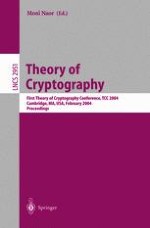2004 | OriginalPaper | Buchkapitel
Indifferentiability, Impossibility Results on Reductions, and Applications to the Random Oracle Methodology
verfasst von : Ueli Maurer, Renato Renner, Clemens Holenstein
Erschienen in: Theory of Cryptography
Verlag: Springer Berlin Heidelberg
Enthalten in: Professional Book Archive
Aktivieren Sie unsere intelligente Suche, um passende Fachinhalte oder Patente zu finden.
Wählen Sie Textabschnitte aus um mit Künstlicher Intelligenz passenden Patente zu finden. powered by
Markieren Sie Textabschnitte, um KI-gestützt weitere passende Inhalte zu finden. powered by
The goals of this paper are two-fold. First we introduce and motivate a generalization of the fundamental concept of the indistinguishability of two systems, called indifferentiability. This immediately leads to a generalization of the related notion of reducibility of one system to another. In contrast to the conventional notion of indistinguishability, indifferentiability is applicable in settings where a possible adversary is assumed to have access to additional information about the internal state of the involved systems, for instance the public parameter selecting a member from a family of hash functions.Second, we state an easily verifiable criterion for a system U not to be reducible (according to our generalized definition) to another system V and, as an application, prove that a random oracle is not reducible to a weaker primitive, called asynchronous beacon, and also that an asynchronous beacon is not reducible to a finite-length random string. Each of these irreducibility results alone implies the main theorem of Canetti, Goldreich, and Halevi stating that there exist cryptosystems that are secure in the random oracle model but for which replacing the random oracle by any implementation leads to an insecure cryptosystem.
